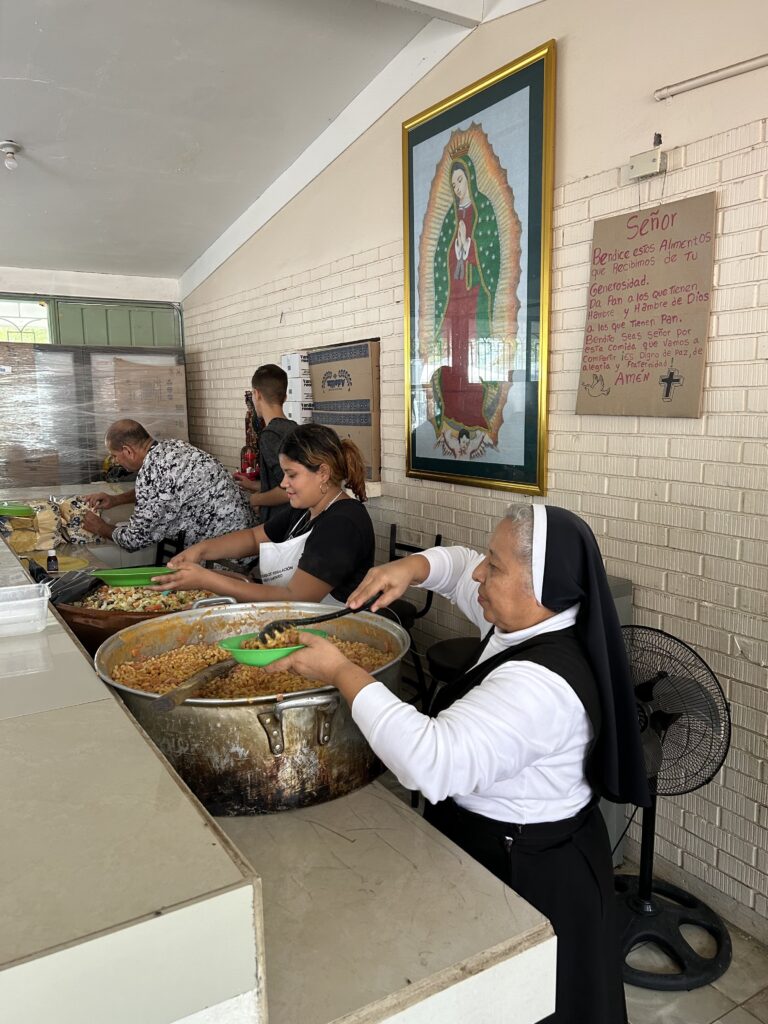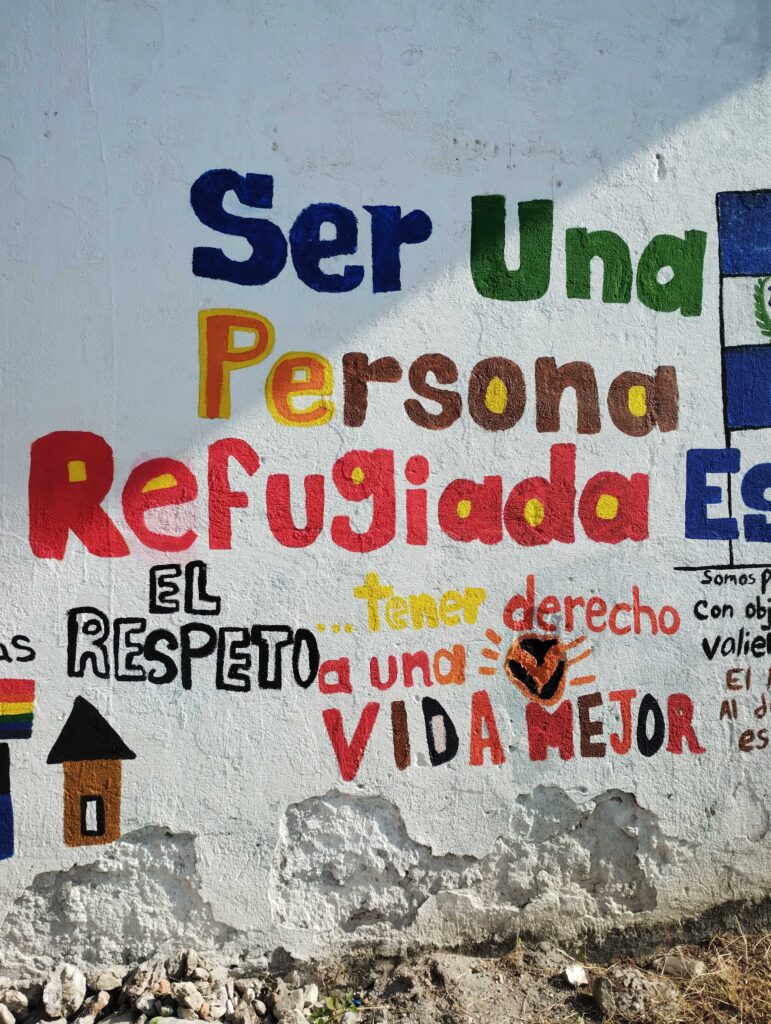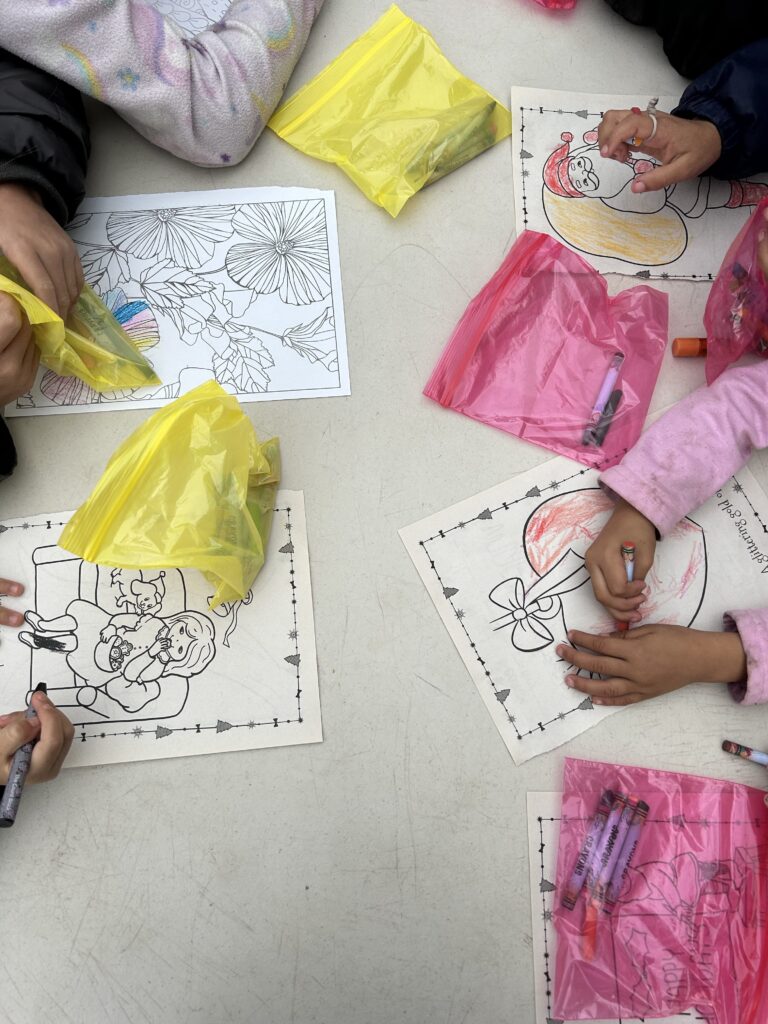Strengthening Connections and Understanding Realities on the Border
Over the last few months of 2023, HIP's Migration and Forced Displacement team visited border cities in the north and south of Mexico to get a deeper understanding of the state of migration as well as understand the needs of local organizations (many of them, grantee partners) who accompany people on the move in the region.
Following these visits, the team shared their experience about the current situation and the impact of human mobility.
Reynosa, Mexico - McAllen, Texas
The border between Mexico and the United States has become a situation where more and more people hope to cross despite the risks of violence, family separation, and other adverse conditions. There are few shelters and organizations that provide protection and accompaniment, and those that are still running face similar risks.
Along their journey through the region of Reynosa and McAllen, migrants become victims of violence at the hands of organized crime groups and authorities who exercise an abuse of power. The team heard about cases of kidnappings outside bus terminals and other serious crimes that would often go unpunished. Throughout the visit, testimonies of extreme violence – from burns to sexual abuse – were shared. As a result, these experiences leave the migrant population in a constant state of vulnerability.
The Casa del Migrante de Reynosa led by Sister Carmen and Sister María, is staffed by a courageous team of Vincentian Sisters, currently supported by Redemptorist Missionaries who have responded to the call of the Diocese of Matamoros to support migrants in Reynosa. They receive migrants and seek to alleviate the abuses they experience by providing them with safe shelter, clothing, food, medical care, and legal and psychological advice.
Despite the challenges, their presence has been critical to supporting migrants because they have taken it upon themselves to accompany them to the hospital, laboratory tests, and even to the crossing of the bridge at the border, among other necessary activities.
On the US side of the border the reality is no less outrageous. Organizations are saturated and, although "zero tolerance" policies have been replaced by others, family separations persist. These majority rural communities, where families exist in situations of poverty, lack access to basic needs such as drinking water, are now fearful that arbitrary persecutions and detentions will increase. For example, the SB4 law in Texas is considered racist and anti-immigrant because it gives broad powers to law enforcement to request information in order to detain those who do not respond, or to go as far as deport people without due process.
Facing these constant challenges are organizations such as The Young Center for Immigrant Children’s Rights who are fight for family reunification and the restitution of children's rights. Similarly, organizations like ARISE Adelante have become a beacon of light as they build and empower their community. They offer more than 20 programs across four centers, emphasizing in direct services for rural areas of the county. The organization's focus on civic participation also highlights the importance of reclaiming rights in an environment where people live in constant fear of being deported.
Piedras Negras, Mexico - Eagle Pass, Texas
Deceptively tranquil, the Rio Grande serves as the physical border that divides these cities and hides various dangers—from shifting currents and barbed wire containers to border patrol boats patrolling the area.
That's why, near this border, the Casa del Migrante Frontera Digna, run by the Franciscan Sisters of Mary Immaculate, has been a vital refuge. The space, formerly a school, serves the migrant population, offering a respite amid uncertainty.

The flow of people is constant. The house, with a capacity for up to 100 people, has been overwhelmed in times of heat, hosting up to 500 people. In times of cold weather, they seek to ensure that no one has to spend the night outdoors, however, the requests often remain overwhelming.
But the space is much more than a refuge. It is an ecosystem in itself where Catholic sisters, social workers, lawyers, and migrant volunteers come together to offer comprehensive support. Doctors Without Borders provides medical care, and volunteer migrants manage entry and exit, cook, serve food, clean, and organize the distribution of clothing.
The stories shared by those at Casa del Migrante revealed the complexity of the migrant experience. Despite stories of forced displacement, sexual violence, and families losing loved ones along the way, each conversation was interwoven with both uncertainty and faith. Within the shelter that aims to promote rest and security, many shared their hopes for a better future.
Tapachula, Mexico -Tecún Umán, Guatemala
Tapachula, the city located just 20 kilometers away from the border with Guatemala, stands as the gateway to Mexico for numerous people seeking refuge and safety from various countries across the Americas and beyond. In this melting pot of migratory movements, organizations such as the Centro de Derechos Humanos Fray Matías de Córdova and Una Mano Amiga en la Lucha Contra El Sida (UMA), play an essential role in supporting and caring for the population on the move.

With an increase and diversification of migratory flows, the city's shelters have been left with insufficient resources, leaving a significant number of people on the streets without shelter.
The organizations consider that both Mexican and US policies have led to the lack of protection observed and in the formation of informal and insecure camps.
The stories of migrants on this border reveal experiences of violence from their countries of origin and on their journey through Central America and Mexico. In Guatemala, police abuse has become a constant. In Mexico, the fear of falling into the hands of criminal groups that extort and violate women has become a palpable reality.
CDH Fray Matías de Córdova and UMA, with more than 25 years of service in Tapachula, have provided psychological and legal support and specialized care in sexual health for HIV and AIDS. However, in the face of such an overwhelming demand, staff at these organizations face fatigue and burnout. These organizations continually adapt to the delicate context and anticipate that challenges will continue.
The Reality of Human Mobility at Borders
These borders bear witness to complex and challenging stories, but also to the resilience and humanity that persist amid adversity. In both the South and the North, we can find that populations on the move face constant violations of their human rights, either by state forces and their dehumanizing immigration policies or by organized crime groups.

In this context, organizations such as Casa del Migrante Reynosa, ARISE Adelante, The Young Center for Immigrant Children's Rights, Casa del Migrante Frontera Digna, CDH Fray Matías de Córdova, Una Mano Amiga en la Lucha Contra El Sida (UMA) and many others , have become key entities that continue to defend the right of people to migrate and choose where to live. These organizations provide support, safe spaces, legal and psychological advice, shelter, food, and clothing to ease the path of people on the move. They also make it possible for migrants to live with dignity wherever they choose to settle.
In each visit, HIP staff witnessed the importance of maintaining effective coordination between grassroots and philanthropic organizations. These relationships are not only key but fundamental to weaving a bond of humanity that transcends and unites all borders. Flexible and sustainable funds, such as those provided through HIP, play a crucial role in supporting operations and providing vital support to people on the move.
